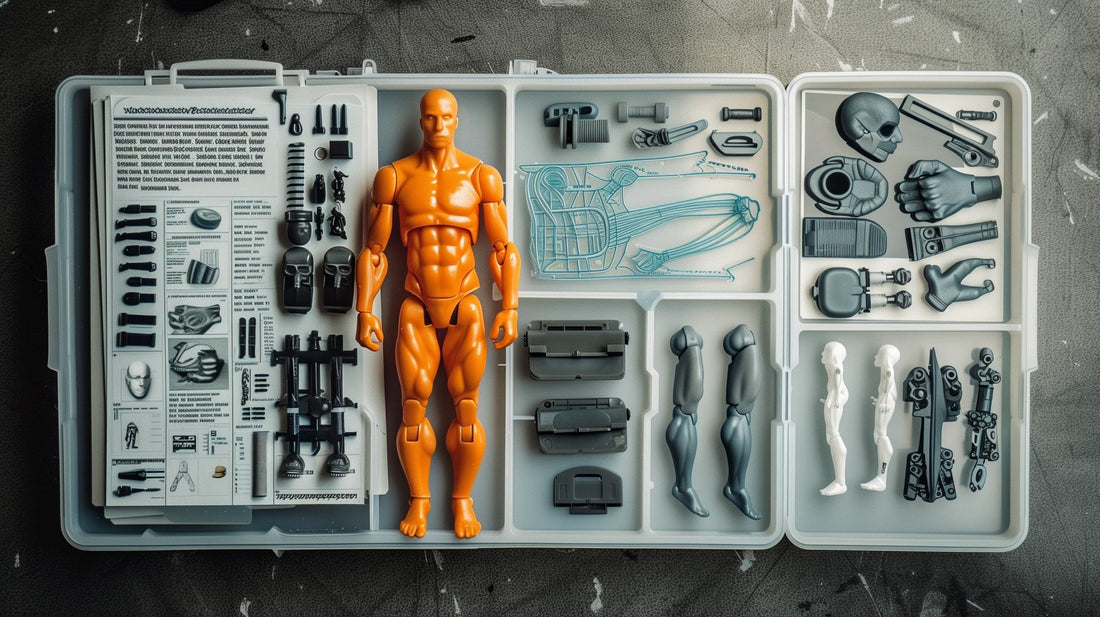
ADHD and relationships: We create the ideal man
Share
Nagging, criticizing, normalizing: It's all just too exhausting – even for today's woman. So we've got you covered with a craft guide for the almost perfect ADHD man of the world.
So much criticism has already been made – and the ADHD man is still not "normal." That takes a lot of energy – including your husband or boyfriend with ADHD. Since you've met a special version of a person (specifically, 1 in 20), perhaps you should also give up hope of being "normal." Because people with ADHD never become neurotypical; they simply compensate for their idiosyncrasies as best they can to avoid attracting negative attention. The result: lack of energy and pent-up aggression. So let's build the ideal ADHD man from scratch.

The central set building blocks
1. Emotion management and conflict avoidance
Men with ADHD often have difficulty regulating their emotions. Tantrums or sudden withdrawals are not uncommon and can easily be misinterpreted by partners as rejection or a lack of affection. These reactions are usually not intentional, but a direct result of ADHD. Instead of responding to such emotional outbursts with accusations, it's more helpful to develop strategies together to better deal with these situations. Taking breaks during a heated conversation and continuing in a calmer atmosphere can make a big difference.
2. Forgetfulness and unreliability
Forgetfulness is a common symptom of ADHD, manifesting as missed appointments, unfinished tasks, or lateness. These behaviors are often interpreted as a lack of interest or "zero respect," but are usually a result of ADHD-related attention deficits. Instead of criticizing their partner for this, couples should create structures together that support memory—for example, through shared calendars, phone reminders, or established routines . Such measures help avoid misunderstandings and strengthen trust in the relationship.
3. Inattention and "not listening"
Men with ADHD often have difficulty concentrating on conversations. This inattention can be interpreted as disinterest, which hurts the partner and causes conflict. In most cases, this isn't due to malicious intent; rather, it's due to an inability to focus on the conversation due to ADHD. One possible solution is to give clear signals before addressing important topics and ensure that the partner is paying attention. Patience and repeating important information can also help avoid misunderstandings.
4. Impulsivity and "shooting three times"
Impulsivity often leads to rash statements or actions that can hurt a partner. These behaviors often occur spontaneously and are not meant to harm, but they can create tension in the relationship. It's important to discuss such situations afterward and develop impulse control strategies together. This may include developing the habit of pausing briefly before reacting to avoid impulsive behavior.

Avoid when crafting to avoid damaging goods
A successful relationship with a partner with ADHD requires awareness and mindfulness in communication. There are specific behaviors that should be avoided at all costs to avoid placing unnecessary strain on the relationship.
The "blame and shame" mistake
A common mistake in relationships with an ADHD partner is blaming and shaming. Constantly blaming the ADHD partner for their difficulties reinforces feelings of shame and rejection, which can put a strain on the relationship. Instead of blaming, it's important to understand the underlying causes of behavior and work together to find solutions. This can create a supportive and respectful atmosphere. Children with ADHD are criticized up to 10 times more often than their neurotypical friends . It's no wonder adults with ADHD are more sensitive in this regard.
Excessive control and the parent-child dynamic
A common dynamic in relationships with an ADHD partner is the non-ADHD partner taking on the "caregiver" role. This dynamic often leads to the ADHD partner feeling patronized and inadequate, which undermines their self-esteem and creates tension. It is important that both partners share responsibilities fairly and respect each other's autonomy in order to maintain a healthy, equal relationship. Do you feel like you have a boy by your side? First, ask yourself to what extent you are acting like a mother instead of confidentially sharing tasks with your husband—or even delegating specific tasks and waiting.

Forms of toxic communication
Certain forms of communication should be avoided in relationships with an ADHD partner:
Sarcasm and ridicule: Sarcastic remarks or ridiculing mistakes are particularly harmful. This behavior conveys the impression that the challenges of the ADHD partner are not being taken seriously. Instead, couples should communicate constructively and encouragingly.
Constant criticism: Constant criticism of your ADHD partner's challenges, such as forgetfulness or disorganization, often leads to withdrawal and defensive behavior. Instead, it's better to use positive reinforcement and work together to find solutions, rather than focusing on mistakes.
Comparisons with "normal" behavior: Comparing your ADHD partner to others who don't have these challenges can be extremely damaging. Such comparisons reinforce feelings of not being good enough and can significantly strain the emotional bond. Instead, partners should focus on their individual strengths—and use them like a team of specialists.

Ignoring ADHD-specific needs
Another common mistake is ignoring the specific needs of an ADHD partner, such as the need for structure or support with organization. If these needs aren't addressed, it can lead to frustration and misunderstandings. You organize too much, he barely does anything? Good, he can get even more done while you take a break.
Unreasonable expectations
Unrealistic expectations can create significant pressure and cause conflict. For example, a partner with ADHD is asked to organize an event and forgets important steps. Instead of blaming others, both partners should set realistic goals and create structures that help the ADHD partner achieve success. Shared to-do lists and regular reminders can help here.

How professionals craft: Positive approaches to avoiding mistakes
Empathy, patience and tolerance
Empathy and patience are crucial for overcoming the challenges that ADHD can bring to a relationship. Tolerance also plays a key role. It means accepting that your partner with ADHD often takes different paths to achieve their goals. These paths may be unconventional, but they usually lead to the desired outcome. By accepting and supporting different approaches, you strengthen the relationship and promote mutual understanding.
Utilizing specific strengths
Instead of focusing on their ADHD partner's weaknesses, couples should take advantage of the unique strengths that ADHD often brings: such as inventiveness, creativity, and hyperfocus when interested. These skills can enrich the relationship and help overcome challenges together. Is "security" important to you? A protector? Well, few neurotypical men want to seriously engage with ADHD men once they "switch to Stone Age brain" (which all ADHDers have a very direct connection to, due to less inhibition from the frontal lobe). Direct access to adrenaline rushes included .
Open and constructive communication
Open and honest communication is key to a healthy relationship. Regular check-ins and space for respectful conversations ensure that both partners feel understood and supported. Clear and respectful communication can avoid misunderstandings and strengthen the relationship.

Conclusion: Be tolerant, use ADHD strengths
Men with ADHD face unique challenges in relationships because they struggle with neurologically based inattention, drivenness/nervousness, and high impulsivity. This is often accompanied by poor short-term memory (improved with medication). Understanding ADHD pitfalls and avoiding common mistakes is key to a healthy and fulfilling partnership. Empathy, patience, tolerance, and leveraging specific strengths are the tools needed to build a stable and loving relationship together.
You wanted a perfect man? Sorry, wrong section. You can find those in fiction, movies, or celebrity magazines. We're here with the craft kits.
PS: Having trouble with the Iron Man model? Yes, it's a hardcore craft kit. We recommend starting with the paper man. If in doubt, just ask your husband.
